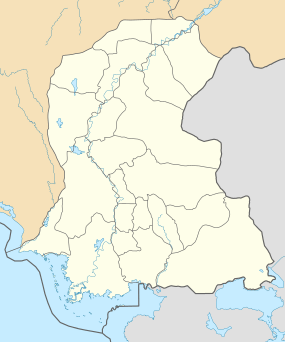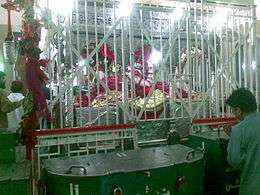Sehwan Sharif
| Sehwan سیہون | |
|---|---|
 Sehwan | |
| Coordinates: 26°25′10″N 67°51′34″E / 26.4193143°N 67.8593731°ECoordinates: 26°25′10″N 67°51′34″E / 26.4193143°N 67.8593731°E | |
| Country |
|
| Province | Sindh |
| District | Jamshoro |
| Population (2012) | |
| • Estimate () | over 100,000 |
| Time zone | PST (UTC+5) |
| Website |
www |
Sehwan (Sindhi: سيهوڻ شريف, Urdu: سیہون) (aka: Sehwan Sharif) is a city located in Jamshoro District in the Sindh province of Pakistan. Sehwan town is of great antiquity and stands on the west bank of the Indus, 80 miles (130 km) north-west of Hyderabad (which is on the east bank). It is possible that the name Sehwan originates from "Siwistan" or "Seevistan", the kingdom of Raja Dahir which even extended to Punjab under the name "Shivi".[1] It was significant enough during the 8th century to be conquered by Muhammad bin Qasim in 711, and two centuries later by Mahmud of Ghazni. An abortive attempt was made by the Mughal emperor Humayun to capture it on his way to Umarkot but it finally fell to his son Akbar. Before this, it was the capital of the Thatta Kingdom under Juni Bek.[2]

The city is known for its Sufi patron saint Hazrat Lal Shahbaz Qalandar who lived here in the 13th century. The famous mausoleum of Shahbaz Qalandar attracts hundreds of thousands of faithfuls every year. Shrine of the famous Sufi Saint, Hazrat Syed Nadir Ali Shah (a notable "Sajjada Nashin" or spiritual successor of Hazrat Lal Shahbaz Qalandar) is also located in Sehwan, where large number of people are served free meals, round the clock. Another famous place is the inverted city, which may be the Debal Bandar of Raja Dahir. Manchar Lake, the largest fresh water lake in Pakistan, is a short distance from Sehwan Sharif.
See also
- Lal Shahbaz Qalandar
- Sehwan Sharif Airport
- Jamshoro District
- Village Radhan
References
- ↑ P. 150, Introduction To Political Science: Political Theory By R.C. Aggarwal.
- ↑ John F. Richards, The New Cambridge History of India: The Mughal Empire (New York: Cambridge University Press, 19930 p. 51
| Wikivoyage has a travel guide for Sehwan. |